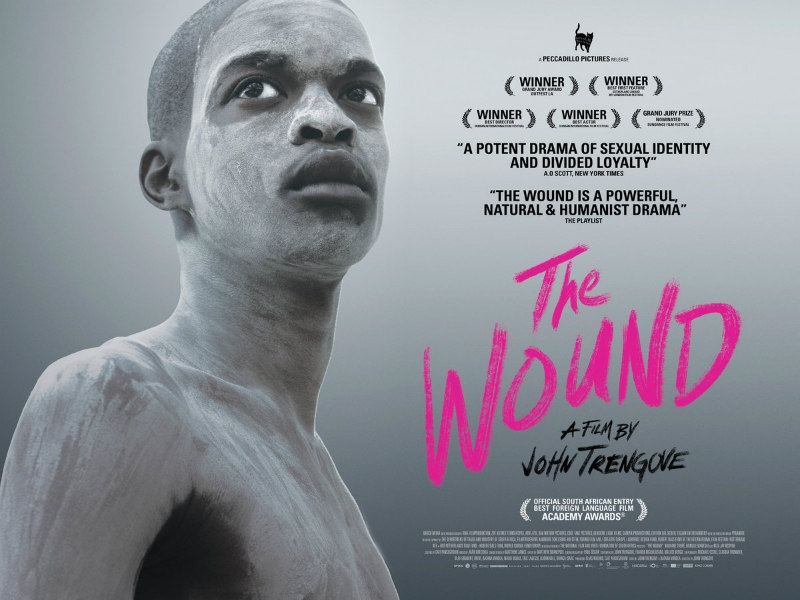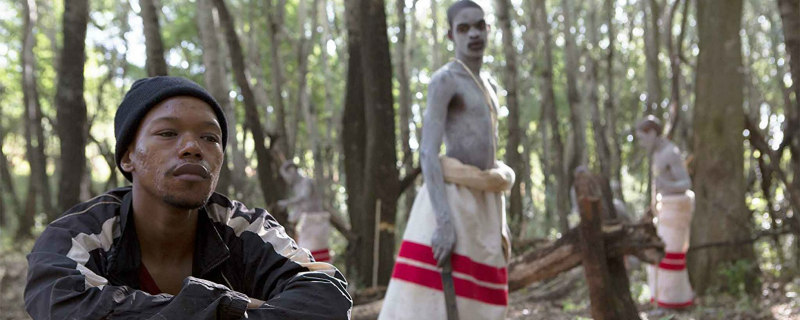
Review by Benjamin Poole
Directed by: John Trengove
Starring: Nakhane Touré, Bongile Mantsai, Niza Jay, Thobani Mseleni, Gabriel Mini

Is the primary theme of mainstream cinema what it means to be a man? A quick glance at the ticket stubs pinned to my notice board - Pacific Rim: Uprising, A Quiet Place, Ready Player One - would suggest so. Two are coming of age dramas that focus explicitly/implicitly on the shadow that fathers/father figures cast upon mixed-up young men, with the narratives of these films going on to outline the individual masculine identities which these lost boy heroes must forge for themselves; while any father watching A Quiet Place is going to experience an extra level of anxiety, in a horror film which relentlessly and so cruelly specifies paternal responsibility. A man’s got to do: it’s everywhere, and even though the films above are ‘meant’ for everyone as mass market cinema, there’s a special poignancy or aspirational element watching them as a fella. Perhaps the universal relevance of maturation makes it a go-to narrative scaffolding, a generally felt dynamic which serves to propel the plots, subtexts and spectacle of genre cinema. Furthermore, the concept can make for gripping and brutally emotive cinema, as these masculine implications are made brutally explicit in writer/director John Trengove’s festival hit The Wound, which details the real-life initiation rites of the Xhosa ceremony and subsequent ordeals of inauguration as a group of teen boys are pitilessly inducted into the world of ‘man’.

Said induction primarily involves standing in a row with about 30 other teen lads in loincloths, having a bucket of cold water chucked over the crotch, and then squatting down, legs spread as some fella with a razor blade roughly chops off a part of their knobs, to which the encouraged response is to shout, ‘I am a man’. But that can’t be all it takes to enter the hallowed halls of adulthood surely? Perhaps not, because the Xhosa ceremony also necessitates that the ‘initiates’ stay in the wilderness of the savanna for three weeks, under the auspices of an attendant, following archaic rituals which entail sacrifice, hard work and violence: the most awful summer camp you could imagine.
We home in on Kwanda (Niza Jay Ncoyini), a rich kid whose dad is especially keen for his son to undergo the initiation as he feels that Kwanda is hanging about with the wrong crowd. "There’s something wrong with those Joburg city boys," he complains to attendant Xolani (Nakhane Touré), going on to explain how his lad often "locks himself in his room" with these urban hipsters. Hmmmmm. And if you see Xolani’s ears prick up then that’s because he too is a homosexual, as is fellow attendee Vija (Bongile Mantsai). Not that any of them could just come out and admit it in this hyper-heteronormative milieu of tradition, swinging dicks and slaughtered goats, oh no. And thus, the stage is set for a knockabout romantic-comedy of errors - get in lad!

Not really, of course. Xolani and Vija are deeply in the kas, with the latter even having a family back in civilisation. Their furtive bouts of sex are restricted to quick knee-tremblers in the woods, away from the initiates and, especially, the elders. It seems that, as ever, in the principles of Xhosa you are defined as much by what you are not as what you are. Homophobia isn’t the word: the society isn’t scared of the gays, more utterly repulsed by the very idea, sublimating supposed fears into a ceremony which involves men routinely and loudly appreciating how well a young man’s mutilated penis is healing. And, besides, the film goes out of its way to show the elders as silly and childish too, treating the ceremony less as a serious religious event and more of a jolly (at one point, for no reason, a couple of them pretend to jump Xolani - bants).
It is worth noting here that regardless of the film’s subjective quality, the cultural relevance of The Wound is evident in the fuss it caused during domestic release in South Africa, with screenings being cancelled due to ‘protests, intimidation and vandalism,’ and cast members having to go into hiding because of the sympathetic portrayals of the gays. There’s me, and perhaps you, sitting at home with a cup of tea and some cats, watching it in blissful safety: sobering. The cinematic tension throughout The Wound is tangible; it is not only sexuality that causes division, but class and race, too. Is The Wound suggesting that a society which fetishises coming of age, commemorating adulthood in such a specifically ruthless manner, is reinforcing partitions and homogeneity?

Trengove builds the mise-en-scene of his film with open fields, waterfalls and firelight, a traditional romantic lexis here transposed to desperate physicality. The relationship between Xolani and Vija is in no way idealised, and is, in fact, completely one sided. In the rough sex they enact, Vija is a selfish top, using Xolani who in turn clearly loves him, much to the chagrin of idealistic Kwanda. The tension continues to build, visually compounded by the persistently lashing machetes which the initiates swipe the air with when they’re not actively hitting each other, ultimately boiling over in a conclusion as devastating as it is inevitable.

The Wound is in UK/ROI cinemas April 27th.

